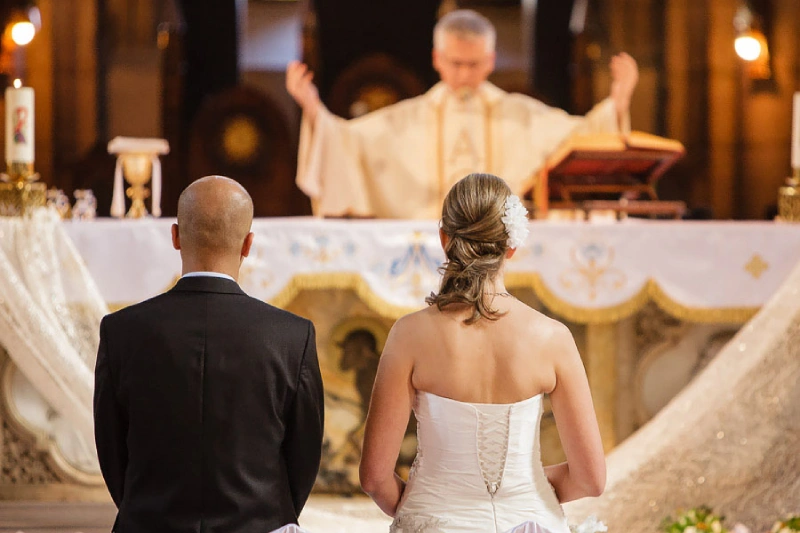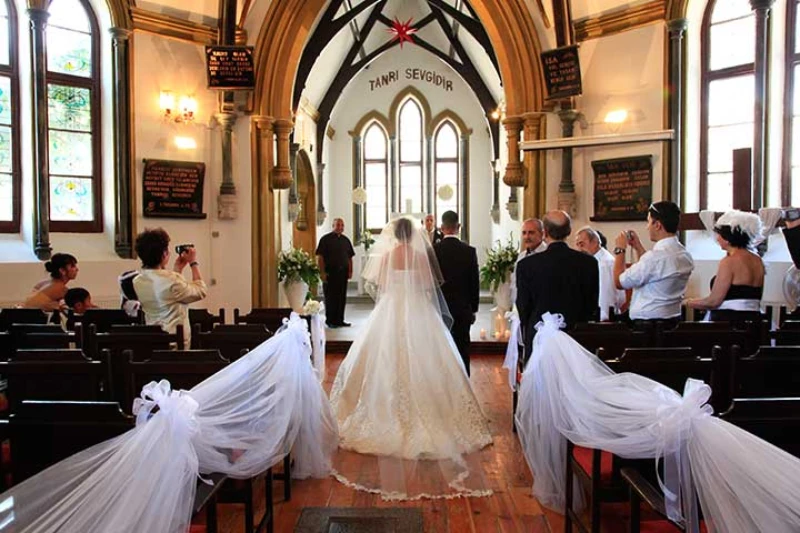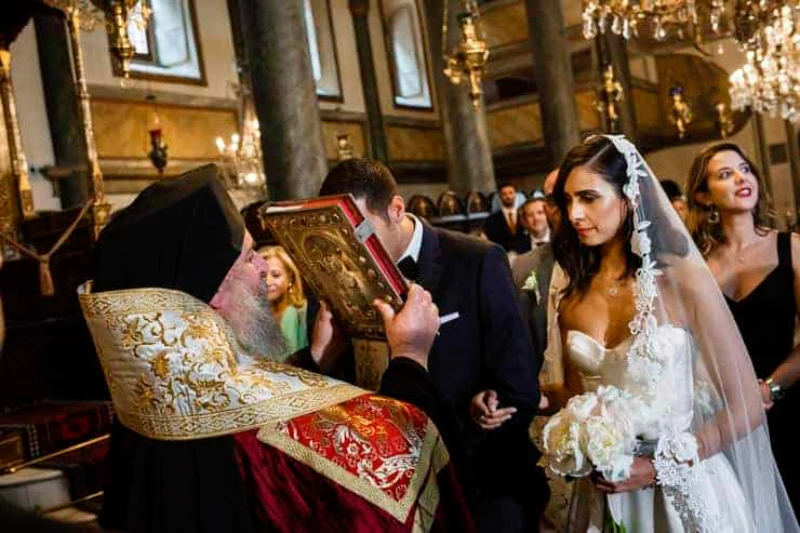
Welcome to the enchanting world of religious wedding ceremonies in Turkey. Steeped in centuries-old traditions and vibrant cultural customs, weddings in Turkey are a sight to behold. With a captivating blend of religious rituals, music, dance, and delectable cuisine, these weddings are cherished as unforgettable moments of joy and celebration.
Turkey, known for its rich history and diverse culture, offers a unique setting for couples seeking a traditional and meaningful wedding experience. Whether it's a Muslim, Christian, or Jewish wedding, Turkey provides a plethora of options, each with its own distinct charm.
From the mesmerizing sound of the call to prayer echoing from the minarets to the stunning beauty of ancient mosques, Muslim weddings in Turkey are a testament to the deep spirituality and devoutness of this faith. Christian weddings, on the other hand, showcase the grandeur of ornate churches adorned with intricate frescoes and graceful arches. And for couples looking for a Jewish wedding, Turkey's Jewish community offers an intimate and profound celebration steeped in centuries of tradition.
Join us as we explore the enchanting world of religious weddings in Turkey, uncovering the unique customs and rituals that make each ceremony truly memorable.
Traditional Religious Wedding Ceremonies in Turkey
Traditional religious wedding ceremonies in Turkey are deeply rooted in the cultural and historical context of the country. Each faith brings its own unique set of customs and rituals, creating a vibrant tapestry of wedding celebrations. For Muslim couples, the ceremony often begins with the Nikah, a religious contract in which the couple agrees to marry in the presence of witnesses and an officiant. The Nikah is typically held in a mosque or a suitable venue, where prayers are recited, and blessings are bestowed upon the couple. This sacred moment emphasizes the spiritual commitment the couple undertakes, and the presence of family and friends enhances the significance of this union.
For Christian couples, the ceremony generally takes place in a church, where a priest officiates the wedding. The service involves various rituals, including the lighting of candles, the exchange of vows, and the crowning of the couple, symbolizing their new life together. The beautiful architecture and serene atmosphere of the church add an aura of divinity to the proceedings, making it a memorable experience for the couple and their families. Moreover, the couple may also incorporate traditional hymns and music that reflect their personal beliefs and heritage, creating a personalized touch to their ceremony.
Jewish weddings in Turkey, though less common, are equally rich in tradition. The ceremony often takes place under a chuppah, a canopy that symbolizes the home the couple will build together. The Rabbi leads the service, which includes the signing of the Ketubah, a marriage contract outlining the husband’s responsibilities to his wife. The couple then exchanges rings, and the ceremony culminates in the couple breaking a glass, representing the fragility of relationships and the joy of the occasion. This unique blend of customs offers an intimate and heartfelt celebration that honors their faith and heritage.

Popular Religious Wedding Venues in Turkey
Turkey boasts a myriad of stunning venues that cater to religious weddings, each offering a unique backdrop for couples to exchange their vows. For Muslim weddings, mosques are often the preferred choice, with many historic and architecturally significant mosques available for ceremonies. The majestic Suleymaniye Mosque in Istanbul, for example, provides an awe-inspiring setting with its grand dome and intricate tile work, making it a popular choice for couples wishing to tie the knot in a place of worship. The tranquil ambiance, coupled with the spiritual significance of the mosque, creates an unforgettable atmosphere for the ceremony.
Christian couples can find an array of beautiful churches across the country that reflect the architectural styles of different eras. The Hagia Sophia, a UNESCO World Heritage site, is one of Istanbul's most iconic landmarks and offers a breathtaking venue for a ceremony. While it now functions as a museum, couples can appreciate its historical significance and unparalleled beauty. There are also numerous smaller, quaint churches in villages and towns throughout Turkey, providing an intimate setting for those seeking a more personal experience. The stunning frescoes and stained glass windows in these churches add a touch of elegance and charm to the celebrations.
For Jewish weddings, venues often include synagogues or more secular locations that can be transformed to reflect Jewish traditions. The Neve Shalom Synagogue in Istanbul, one of the largest and most significant in the country, offers a traditional setting for Jewish couples. Couples can also opt for gardens or banquet halls where they can create their own unique atmosphere while still adhering to their cultural and religious customs. Regardless of the venue chosen, each location plays an essential role in creating an unforgettable experience for the couple and their guests.
Traditional Turkish Wedding Customs and Rituals
Turkish weddings are known for their vibrant customs and rituals that reflect the country’s rich heritage. One of the most significant pre-wedding customs is the "Kına Gecesi" or henna night, which is celebrated the night before the wedding. This event is primarily for the bride and her female relatives and friends, where henna is applied to the bride's hands and feet as a symbol of fertility and good luck. The atmosphere is filled with laughter, songs, and dances, creating a festive environment. This ritual not only serves as a way to bond with family and friends but also marks the bride's transition from singlehood to married life.
Another essential custom is the "Gelin Alma," where the groom and his family visit the bride's home to formally ask for her hand in marriage. This ceremony often involves bargaining over the bride's dowry, which can include gifts or money. Once the families agree, the groom's family brings the bride to the wedding venue, accompanied by music and dancing. This procession is filled with joy, and guests often shower the couple with flower petals or rice as a symbol of prosperity and happiness.
During the wedding ceremony, traditional Turkish music plays a significant role, with live musicians often present to enhance the celebratory atmosphere. The couple typically dances together, performing traditional dances such as the "Zeybek" or "Halay," which involve intricate footwork and lively rhythms. These customs not only celebrate the couple's union but also honor the cultural heritage of Turkey, making each wedding an unforgettable event filled with love, laughter, and rich traditions.
Religious Wedding Attire in Turkey
Attire plays a crucial role in religious weddings in Turkey, with each faith showcasing its distinct clothing styles that reflect cultural and religious significance. For Muslim weddings, the bride often wears a lavish white gown adorned with intricate embroidery and embellishments, symbolizing purity and elegance. Traditionally, brides also wear a headscarf or hijab, which reflects modesty in Islamic culture. The groom typically opts for a formal suit, often accompanied by a traditional fez or turban, depending on regional customs. These outfits are not only aesthetically pleasing but also resonate with the spiritual importance of the ceremony.
Christian brides in Turkey tend to embrace Western-style wedding gowns, often featuring elaborate lacework and long trains. These dresses may be accompanied by veils and tiaras, adding an air of sophistication to the bride's appearance. Grooms usually wear classic suits or tuxedos, reflecting contemporary fashion trends. However, some couples choose to incorporate traditional elements, such as wearing a "crown" during the ceremony, symbolizing their commitment to each other and their faith. The selection of attire allows couples to express their personality while honoring their religious customs.
For Jewish weddings, the bride often wears a beautiful gown, similar to Christian traditions, but may also choose to cover her shoulders or wear a shawl to align with Jewish customs. The groom typically dons a kippah, a traditional head covering, during the ceremony as a sign of respect. In some cases, couples will incorporate traditional Jewish elements, such as a tallit, into their attire, further emphasizing their faith. The attire chosen for each wedding highlights the individuality of the couple while embracing the rich tapestry of Turkey's diverse religious practices.
Turkish Wedding Traditions and Superstitions
Turkish weddings are steeped in traditions and superstitions that date back generations, many of which are believed to bring good fortune and prosperity to the couple. One common tradition is the "Çeyiz," or dowry, which includes household items, clothing, and jewelry prepared by the bride's family. It is customary for the groom's family to present gifts in return, indicating mutual respect and appreciation. The exchange of these items symbolizes the family's support for the couple's new life together and is often accompanied by blessings from both families.
Another fascinating tradition is the practice of "breaking a plate" during the wedding reception. Guests take part in this ritual by smashing plates to symbolize the couple's commitment to each other and to bringing good luck. It is believed that the louder the plates break, the more prosperous the couple's marriage will be. This lively custom adds an element of fun and excitement to the celebration, fostering a sense of community among family and friends.
Superstitions also play a significant role in Turkish weddings. For instance, it is considered bad luck for the bride to try on her wedding dress before the wedding day, as it is believed that doing so will bring misfortune. Additionally, it is customary for the couple to avoid seeing each other for a few days leading up to the wedding, as it is thought that this will help preserve the excitement and anticipation of the event. These traditions and superstitions not only enhance the wedding experience but also reflect the rich cultural heritage that permeates Turkish society.
Religious Wedding Food and Drinks in Turkey
Food plays a central role in Turkish wedding celebrations, where an array of delectable dishes is served to guests, showcasing the country's rich culinary heritage. For Muslim weddings, it is common to serve a halal menu, featuring traditional dishes such as "kebab," "dolma" (stuffed grape leaves), and "pilaf." These meals are often accompanied by fresh salads and yogurt, creating a delightful feast that reflects the couple's cultural background. The presentation of food is equally important, with beautifully arranged platters and colorful displays that enhance the dining experience.
Christian weddings often feature similar traditional dishes, with the addition of regional specialties that vary from one area to another. For instance, in the coastal regions, seafood may be a highlight, while inland areas might focus on hearty stews and meat dishes. Desserts also play a pivotal role in the celebration, with options such as "baklava," a sweet pastry layered with nuts and honey, and "şerbet," a refreshing fruit drink, being popular choices. The variety of dishes served not only satisfies the guests but also symbolizes the abundance and joy of the couple's new life together.
Jewish weddings typically include kosher cuisine, with an emphasis on traditional dishes that adhere to dietary laws. Celebrations often feature challah bread, brisket, and various vegetable dishes, ensuring that all guests can enjoy the meal. The couple may also choose to incorporate traditional Jewish sweets, such as rugelach or babka, into the dessert table. Regardless of the religious background, the food served at Turkish weddings is a testament to the couple's heritage and serves as a way to share their culture with family and friends, making each celebration truly special.
Best Time to Have a Religious Wedding in Turkey
When planning a religious wedding in Turkey, timing is essential to ensure a memorable experience for the couple and their guests. The peak wedding season in Turkey typically falls between May and September, characterized by warm weather and longer days, making it an ideal time for outdoor ceremonies and celebrations. Many couples opt for spring or early summer weddings to take advantage of the beautiful blooming landscapes and pleasant temperatures. This time also aligns well with various religious calendars, allowing couples to choose dates that are significant to their faith.
Aside from the weather, it's also essential to consider local holidays and festivities when planning a wedding. For example, Ramadan, the holy month of fasting for Muslims, may influence the timing of Muslim weddings, as many couples prefer to wait until after Eid al-Fitr, the festival marking the end of Ramadan. Similarly, Christian couples may wish to avoid dates that coincide with Lent or other significant religious observances. By being mindful of these factors, couples can select a date that not only suits their preferences but also respects their religious customs.
In addition to weather and religious considerations, it's also worth noting that certain venues may have seasonal availability and pricing. Booking well in advance during peak wedding season can help couples secure their desired location, while off-peak months may offer more flexibility and cost-effective options. Ultimately, choosing the right time for a religious wedding in Turkey involves balancing personal preferences, cultural significance, and practical considerations to create an unforgettable celebration.
Planning a Religious Wedding in Turkey - Tips and Advice
Planning a religious wedding in Turkey can be an exciting yet challenging endeavor, as couples navigate various customs, venues, and logistics. One of the first steps in the planning process is to establish a budget that encompasses all aspects of the wedding, including venue rental, catering, attire, and decorations. Understanding the costs associated with each element will help couples prioritize their spending and make informed decisions. It’s also advisable to set aside a contingency fund to accommodate any unforeseen expenses that may arise.
Once the budget is established, couples should start researching venues that align with their religious beliefs and personal preferences. Visiting potential locations in person can provide valuable insight into the ambiance and suitability of each venue. It’s essential to inquire about the availability of the venue on the desired date, as well as any additional services they may offer, such as catering or event coordination. Additionally, couples should consider the logistics of the location, including accessibility for guests and nearby accommodation options.
Lastly, seeking the help of a local wedding planner who understands the intricacies of religious weddings in Turkey can be a valuable investment. A planner can assist with navigating cultural customs, coordinating vendors, and ensuring that all religious requirements are met. Couples should also communicate openly with their families about their wishes for the wedding, as family involvement in the planning process is often significant in Turkish culture. By following these tips and remaining organized throughout the planning journey, couples can create a beautiful and meaningful religious wedding that reflects their love and commitment to each other.

Conclusion and Final Thoughts on Religious Weddings in Turkey
Religious weddings in Turkey offer couples a unique opportunity to blend tradition, spirituality, and cultural richness into their celebrations. With a diverse array of customs, rituals, and venues to choose from, each wedding is a reflection of the couple's faith and heritage. From the enchanting ceremonies held in historic mosques and ornate churches to the lively celebrations filled with traditional music and dance, these weddings are a testament to the beauty of love and commitment.
The intricate details that characterize Turkish weddings, from the attire to the food, play an essential role in creating a memorable experience for both the couple and their guests. By embracing the cultural customs and superstitions that have been passed down through generations, couples can curate a celebration that resonates with their values and beliefs. Additionally, the rich culinary offerings serve to bring people together, fostering a sense of community and joy during the festivities.
As couples embark on the journey of planning their religious wedding in Turkey, they are invited to immerse themselves in the enchanting traditions and vibrant culture that the country has to offer. With careful planning, thoughtful consideration, and a deep appreciation for their heritage, they can create a celebration that honors their love and faith, leaving an indelible mark on their hearts and those of their loved ones. Turkey, with its captivating landscapes and rich history, serves as the perfect backdrop for these unforgettable moments of love and unity.